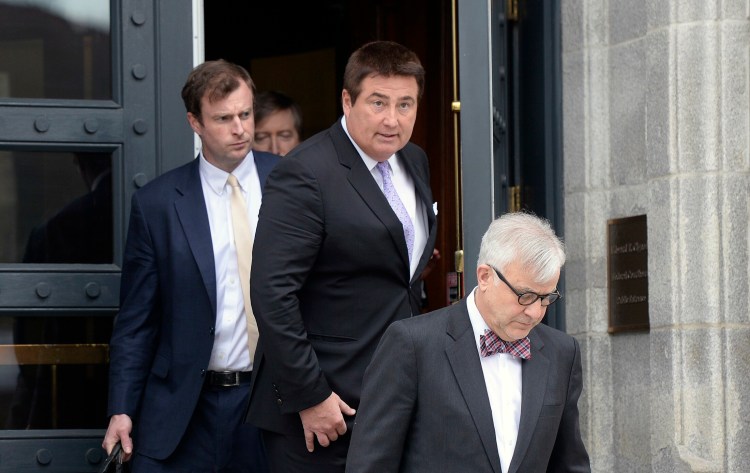Former Portland real estate developer Michael Liberty is one of at least two Mainers among the nearly 150 people granted last-minute pardons by outgoing President Donald Trump.
In addition to Liberty, who was convicted of campaign finance violations in 2016, Trump also commuted the sentence of an Aroostook County man, Michael Pelletier, who was serving life in prison for running a marijuana smuggling operation.
Trump’s final pardons included a wide range of individuals convicted for a variety of crimes. The list includes many allies and political contributors, including Steve Bannon, a former campaign chairman and adviser.
In announcing the pardons Wednesday morning, the White House noted that Liberty, 60, who now lives in Florida, “is the father of seven children and has been involved in numerous philanthropic efforts.”
In addition to the 2016 conviction, he was set to go to trial in Maine in September on charges including wire fraud, securities fraud and conspiracy to commit money laundering in connection with what investigators said was a multimillion-dollar scheme to trick investors who thought they were putting money into Mozido, a financial technology firm Liberty had founded in Texas. He also faced a separate civil case filed by the U.S. Securities and Exchange Commission around the same allegations, but that case was put on hold while the criminal trial moved forward.
Prosecutors alleged that the money raised from investors was instead used to fund Liberty’s lavish lifestyle.
Liberty’s lawyer, Thimi Mina, declined a request for an interview Wednesday. A spokesman for the U.S. Attorney’s office said he was unsure of the procedure and timing for introducing the pardon in court to get the charges against Liberty dismissed.
Liberty’s request for clemency was supported by Maine Rep. Susan Austin, R-Gray, and Matthew Sturgis, a former chairman of the Gray Town Council who is now the Cape Elizabeth town manager, according to the announcement.
Liberty is from Gray and is well known in Greater Portland as a developer whose projects included the Chandler Wharf condominiums on Commercial Street and two large office buildings on Middle Street. His proposal for a large mixed-use project on Long Wharf led to a backlash and a successful moratorium to ban most non-marine uses on the waterfront.
In addition to development, Liberty had a long history of political contributions. He pleaded guilty in 2016 to illegally contributing $22,500 to the presidential campaign of Republican Sen. Mitt Romney of Utah in 2012. The limit for individual donations is $2,500, but Liberty made donations in the names of employees and family members to effectively make nine contributions of $2,500.
Liberty was sentenced to four months in jail and fined $100,000 by a federal judge who called his actions “the quintessential white-collar crime.”
He also gave nearly $100,000 in 2014 to Michael Edes’ unsuccessful campaign for Cumberland County Sheriff, but there were no limits on contributions in that race.
Pelletier, the Aroostook County man, was one of several people on the pardon list who had been convicted of nonviolent, marijuana-related offenses.
A jury found him guilty in July 2007 of drug smuggling, money laundering and Social Security fraud charges. Pelletier, who lived in St. David, did not handle the marijuana himself but organized the group that brought duffel bags of the drug from Canada into Maine. A federal judge sentenced him to life in prison.
Pelletier, now 64, filed a motion for compassionate release earlier this year under the First Step Act, which changed the way prisoners can petition for a reduction in their sentences. His attorney argued that the mandatory minimum for his crimes has gone from life to 25 years, and that changing social views on marijuana have impacted state laws and federal policies.
Pelletier also filed memos about COVID-19 cases at the federal prison in Terre Haute, Indiana, where he is incarcerated. Those documents show that he tested positive for the virus in the fall. Pelletier uses a wheelchair because he has been paralyzed from the waist down since he was a child, and his attorney argued his age and medical conditions put him at greater risk of serious illness or death if he were to contract the virus again.
The U.S. Attorney’s Office had asked the court to deny the motion, and the case was still pending when Trump granted the commutation.
A White House statement noted that Pelletier “has maintained a clear disciplinary record, has thrived as an artist working with oil paints on canvas, and has taken several courses to perfect his skill while incarcerated.” It also said Pelletier will find employment and housing with his brother. Court documents show that Pelletier’s brother lives in Florida, where Pelletier hopes to continue to paint and establish his own business.
The presidential declaration of clemency directs prison officials to notify Pelletier and to arrange for his release “with all possible speed.”
Staff Writers Edward D. Murphy and Megan Gray contributed to this report.
Copy the Story LinkSend questions/comments to the editors.




Success. Please wait for the page to reload. If the page does not reload within 5 seconds, please refresh the page.
Enter your email and password to access comments.
Hi, to comment on stories you must . This profile is in addition to your subscription and website login.
Already have a commenting profile? .
Invalid username/password.
Please check your email to confirm and complete your registration.
Only subscribers are eligible to post comments. Please subscribe or login first for digital access. Here’s why.
Use the form below to reset your password. When you've submitted your account email, we will send an email with a reset code.